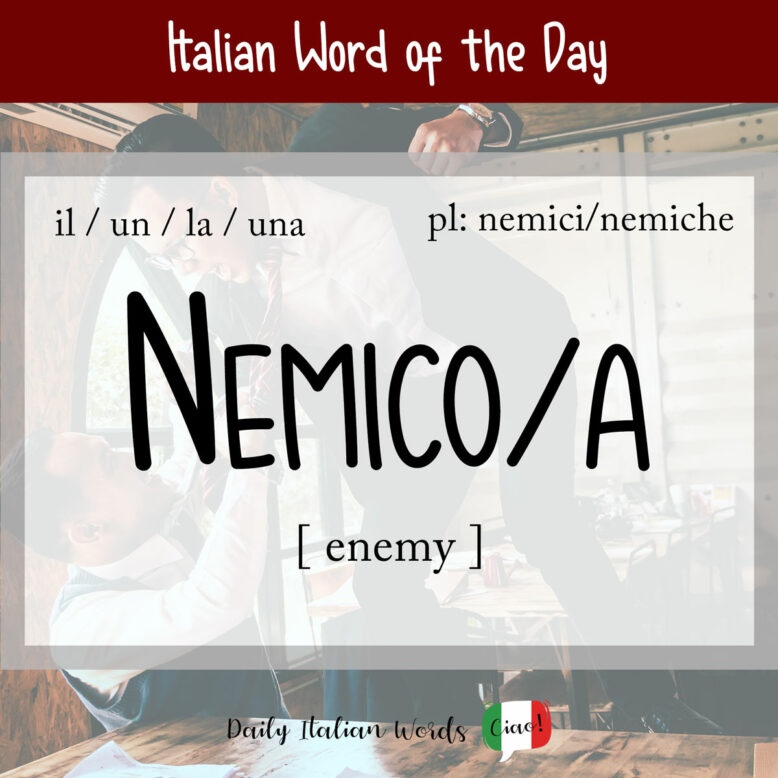The opposite of a friend, or amico, in Italian is a nemico (enemy). It should be fairly easy to remember as it shares the same origin as the English word nemesis.

Nemico is a masculine noun that takes the following definite and indefinite articles:
- il nemico = the enemy
- i nemici = the enemies
- un nemico = an enemy
- dei nemici = (some) enemies
But of course, in the scenario where your worst enemy is a woman, you would need to employ the feminine form nemica to describe her.
- la nemica = the enemy
- le nemiche = the enemies
- una nemica = a enemy
- delle nemiche = (some) enemies
Non vorrei proprio averlo come nemico.
I wouldn’t want him as an enemy.
Used as a noun, nemico is also the term for an enemy, foe or adversary in the context of war, or opponent in political terms. Some common war expressions include darsi al nemico (to give oneself up to the enemy), cadere in mano al nemico (to fall into enemy hands) and passare al nemico (to side with the enemy).
I soldati feriti sono caduti in mano al nemico.
The injured soldiers fell into enemy hands.
Below are some common types of nemici:
- nemico giurato = sworn enemy
- nemico pubblico = public enemy
- arcinemico = arch enemy
- nemico comune = common enemy
- nemico mortale = mortal enemy
- nemico politico = political opponent

Nemico can also function as an adjective, once again with the meaning of enemy, opposing, hostile or contrary. For example:
- soldati nemici = enemy soldiers
- linee nemiche = enemy lines
- forze nemiche = enemy forces
- campo nemico = enemy camp
- navi nemiche = enemy ships
Mi è diventato nemico dopo la disputa.
He became hostile towards me after the argument.
The term nemico also encompasses the meaning of “someone who opposes or detests something.” For instance, you can be the nemico della droga (opponent of drugs) or nemico del progresso (opponent of progress). An amusing idiomatic expression in Italian is essere nemico dell’acqua (literally “to be an enemy of water”), which is used to describe a person who either avoids bathing or prefers drinking wine over water.
It can also mean that something is harmful, detrimental or unfavorable. For example, if you say il gelo è nemico delle piante, it means that frost is harmful to plants.
L’alcol è nemico del fegato.
Alcohol is bad for the liver.
You may often hear the expression farsi nemico qualcuno, which means to make an enemy of someone.
To conclude, here are three proverbs about nemici you might encounter during your studies:
Molti nemici, molto onore
Literal translation: Many enemies, much honour
Meaning: Having adversaries is a sign of worthiness
Dagli amici mi guardi Iddio, che dai nemici mi guardo io
Literal translation: May God protect me from my friends, as I will protect myself from my enemies
Meaning: It is easier to defend oneself against declared enemies than against deceitful friends
A nemico che fugge ponti d’oro
Literal translation: To a fleeing enemy, golden bridges
Meaning: Always leave an escape route for the enemy, with the goal of making them flee rather than destroying them
Heather Broster is a graduate with honours in linguistics from the University of Western Ontario. She is an aspiring polyglot, proficient in English and Italian, as well as Japanese, Welsh, and French to varying degrees of fluency. Originally from Toronto, Heather has resided in various countries, notably Italy for a period of six years. Her primary focus lies in the fields of language acquisition, education, and bilingual instruction.


